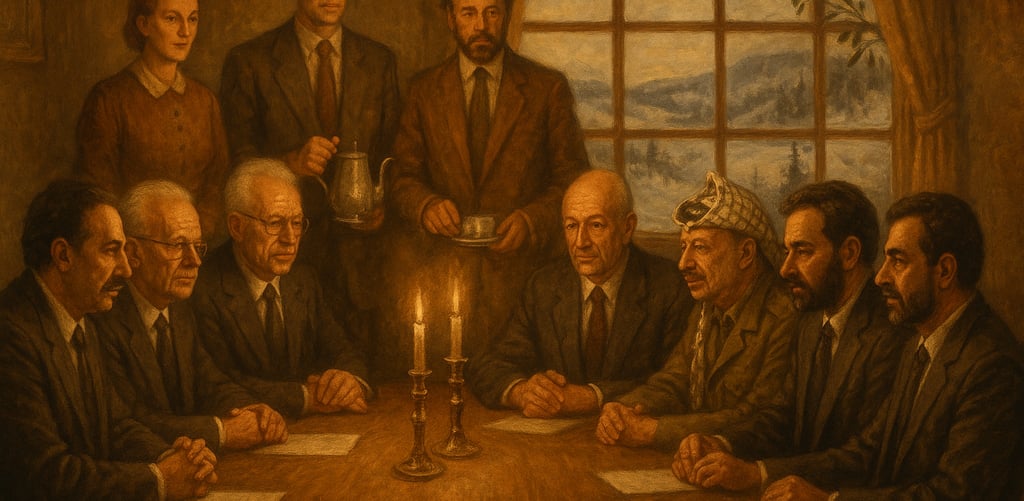Norway and the Palestinians: Oslo’s Role in a Historic Peace Effort
Discover how Norway hosted secret talks between Israel and the Palestinians, leading to the 1993 Oslo Accords. Learn how a small nation’s neutrality, persistence, and solidarity shaped one of the Middle East’s most significant negotiations.
ENGLISH THROUGH HISTORY
Adi English
4 min read


🌍 Story 9 – Norway & the Palestinians (Oslo Accords, 1993)
LEVEL 3 – Advanced
Length: (~532 words)
By the early 1990s, the Israeli–Palestinian conflict had dragged on for decades. Palestinians lived under occupation, facing checkpoints, restricted movement, and economic hardship. Calls for freedom and national recognition grew louder, but most international efforts to broker peace had failed. Many believed that genuine negotiations were impossible.
In this tense climate, Norway, a small Scandinavian country known for neutrality, played an unexpected role. Unlike the United States or other powers, Norway had no colonial past in the Middle East, no army in the region, and no hidden agenda. Its reputation for fairness and mediation allowed it to act as a quiet bridge between two bitter enemies.
In 1993, secret meetings began in Oslo between representatives of Israel and the Palestine Liberation Organization (PLO). Away from the cameras and political pressure, negotiators spoke honestly for the first time. The Norwegians offered more than meeting rooms: they provided hospitality, food, and an environment of trust. In this safe space, ideas could be tested without fear of immediate rejection.
The result was the Oslo Accords, signed in Washington D.C. in September 1993. For the first time, Israel officially recognized the PLO as the representative of the Palestinian people, while the PLO recognized Israel’s right to exist. Palestinians were promised limited self-rule in parts of Gaza and the West Bank. Though imperfect, it was a historic breakthrough.
For Palestinians, Norway’s role went beyond symbolism. It showed that even a small nation could influence one of the world’s hardest conflicts. The talks created hope that daily life might improve and that their long fight for dignity and statehood was not invisible to the world.
Norway also provided solidarity after the accords. It sent development aid, scholarships, and humanitarian support. Norwegian teachers, doctors, and peace monitors worked in Palestinian communities, often in difficult conditions. This combination of moral commitment and practical assistance reinforced Norway’s reputation as a trusted ally.
Norway’s involvement also reshaped its own identity on the global stage. Until the 1990s, it was rarely seen as a major diplomatic actor. But by successfully hosting the Oslo talks, Norway demonstrated that even small nations could play a role in solving international crises. This boosted its reputation as a champion of peace and human rights. In the years that followed, Norway took part in other mediation efforts, from Sri Lanka to Colombia. For Palestinians, this meant their cause was tied to a larger movement in which Norway positioned itself as a reliable advocate for justice and peaceful solutions.
Of course, the Oslo Accords later faced criticism. Violence continued, and many promises went unfulfilled. Some Palestinians felt betrayed as settlements expanded and hardships persisted. Yet the fact that talks had occurred at all — and that recognition had been exchanged — was still significant.
Norway’s role highlights an important truth: neutrality and moral authority can matter as much as military or economic power. By offering patience, persistence, and hospitality, Norway created space for dialogue where others had failed.
Today, Palestinians remember Norway’s efforts with mixed feelings: gratitude for the breakthrough, and disappointment for what was left incomplete. But the story remains a powerful example of how small nations, acting with courage and conviction, can shape history.
Vocabulary (10 words)
Freedom – the right to live without unfair control.
Explanation: Palestinians longed for freedom under occupation.
Example: They marched for freedom and dignity.
Student example: ____________
Mediation – helping two sides in conflict reach agreement.
Explanation: Norway acted as mediator in the talks.
Example: The UN offered mediation in the dispute.
Student example: ____________
Accords – formal agreements between parties.
Explanation: The Oslo Accords were signed in 1993.
Example: The accords promised cooperation.
Student example: ____________
Recognition – official acceptance of a group or state.
Explanation: Israel recognized the PLO for the first time.
Example: Recognition gave the group legitimacy.
Student example: ____________
Self-rule – the ability of a people to govern themselves.
Explanation: Palestinians gained partial self-rule under the accords.
Example: Self-rule was a step toward independence.
Student example: ____________
Solidarity – unity and support in difficult times.
Explanation: Norway showed solidarity by sending aid.
Example: The workers stood in solidarity during the strike.
Student example: ____________
Neutrality – not taking sides in conflict.
Explanation: Norway’s neutrality made it a trusted mediator.
Example: Neutrality helped build confidence in the talks.
Student example: ____________
Hospitality – generous and warm treatment of guests.
Explanation: Norway gave hospitality to negotiators.
Example: Hospitality helped create trust.
Student example: ____________
Persistence – continuing effort despite obstacles.
Explanation: Norway’s persistence kept dialogue alive.
Example: His persistence finally led to progress.
Student example: ____________
Legacy – what remains from past actions.
Explanation: The Oslo Accords left a mixed legacy.
Example: The legacy of the talks still shapes politics.
Student example: ____________
Exercises (Level 3 – Advanced)
Comprehension
What role did Norway play in 1993?
What were the Oslo Accords?
What did Palestinians gain from them?
Why was Norway trusted as a mediator?
How is the legacy remembered today?
Multiple Choice
Where were the secret talks held?
a) Washington D.C. b) Oslo c) Geneva d) London
When were the Oslo Accords signed?
a) 1987 b) 1993 c) 2001 d) 1979
Who represented the Palestinians?
a) Hamas b) PLO c) UN d) Egypt
What did Palestinians gain?
a) Full independence b) Partial self-rule c) Weapons d) Nothing
Why was Norway’s role unique?
a) It was a superpower b) It was neutral and trusted c) It had a large army d) It colonized Palestine
Fill in the Blank
The Oslo _______ were signed in 1993.
Palestinians gained partial _______.
Norway acted as a _______ between enemies.
Israel gave official _______ to the PLO.
The story shows the power of _______.
True/False
The Oslo talks were secret at first.
Israel recognized the PLO for the first time.
Norway sent armies to enforce peace.
The accords promised limited self-rule.
The conflict ended completely in 1993.
Discussion
Why might a small nation succeed where big powers fail?
Can dialogue change long conflicts?
What risks do mediators take in global politics?
Should more countries follow Norway’s example?
How can peace talks shape the next generation?
